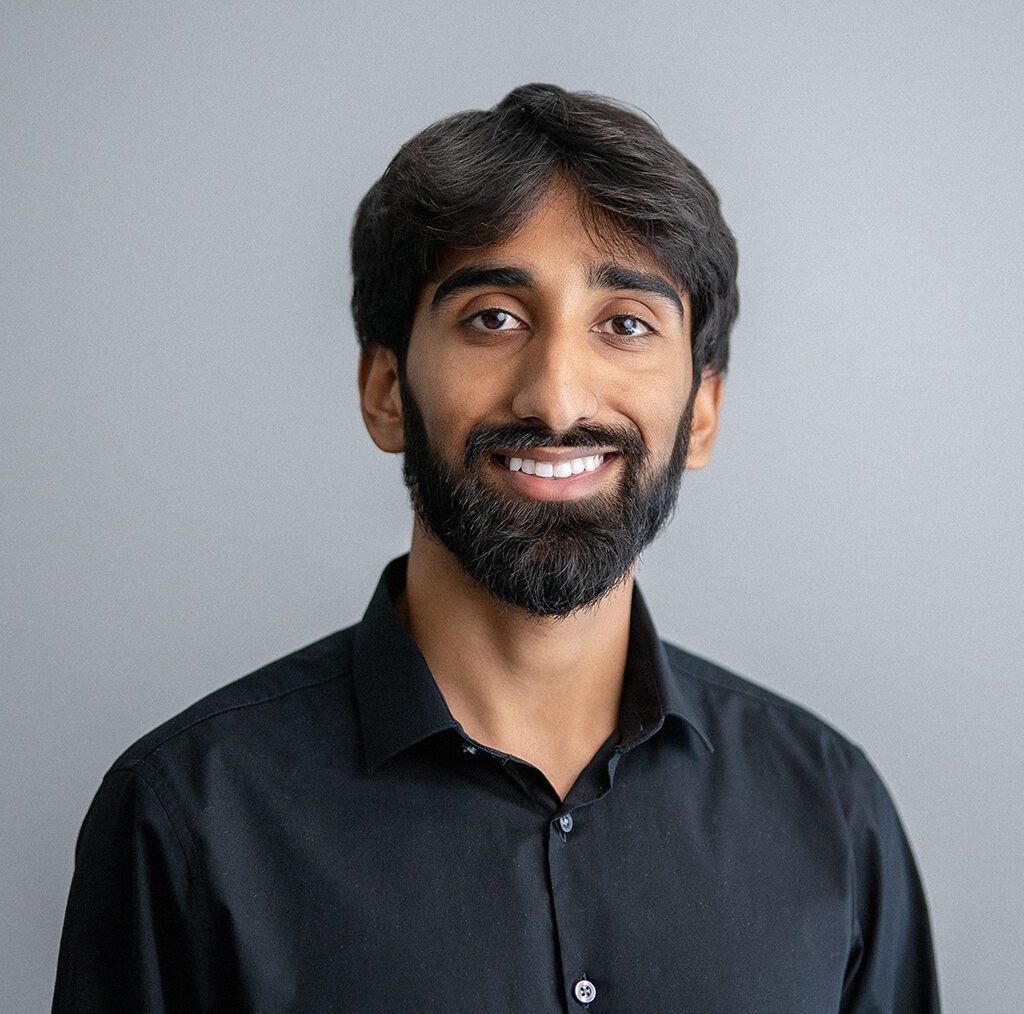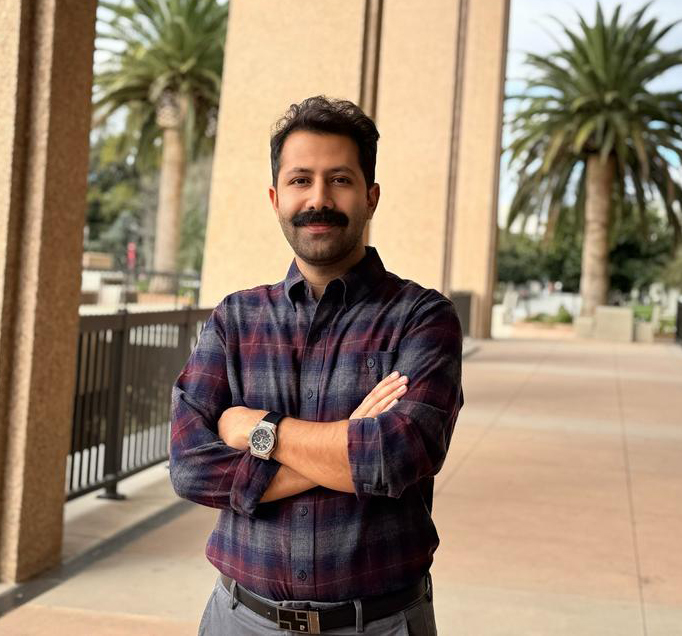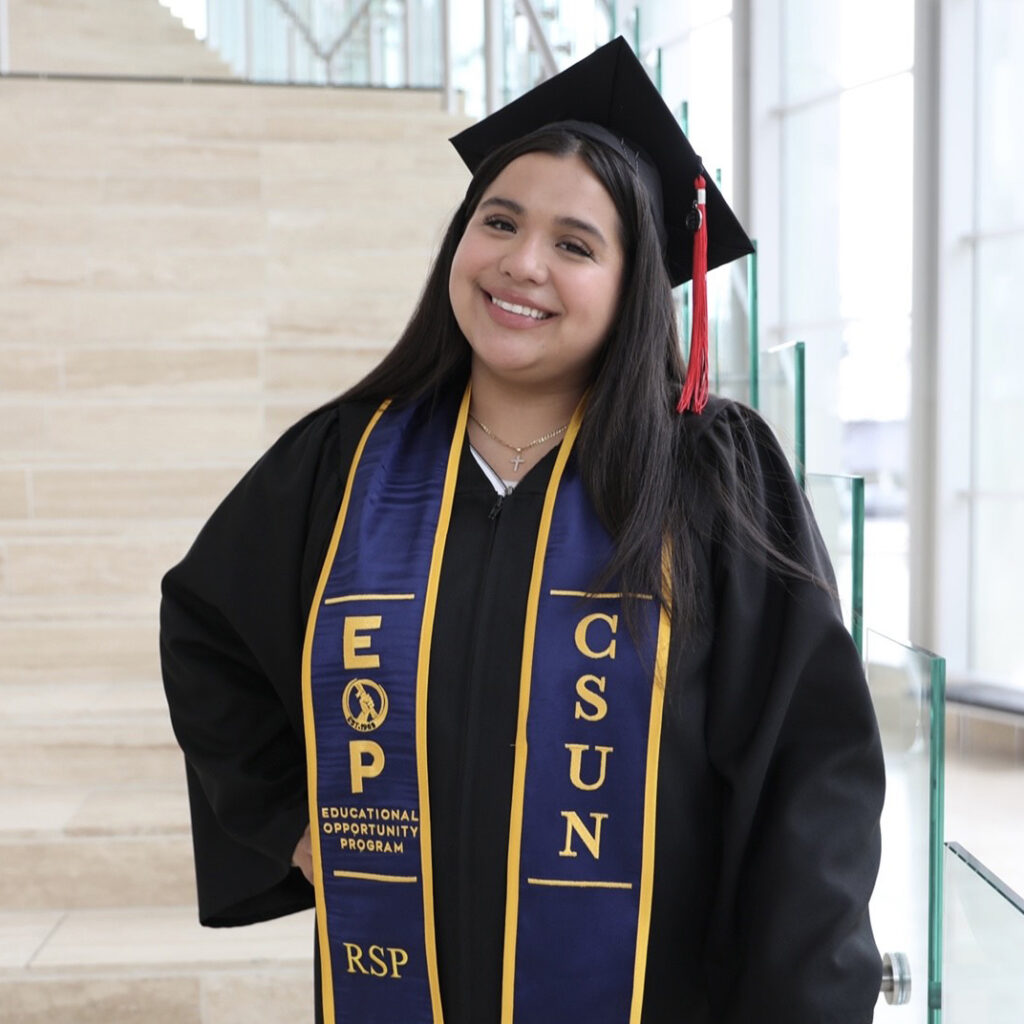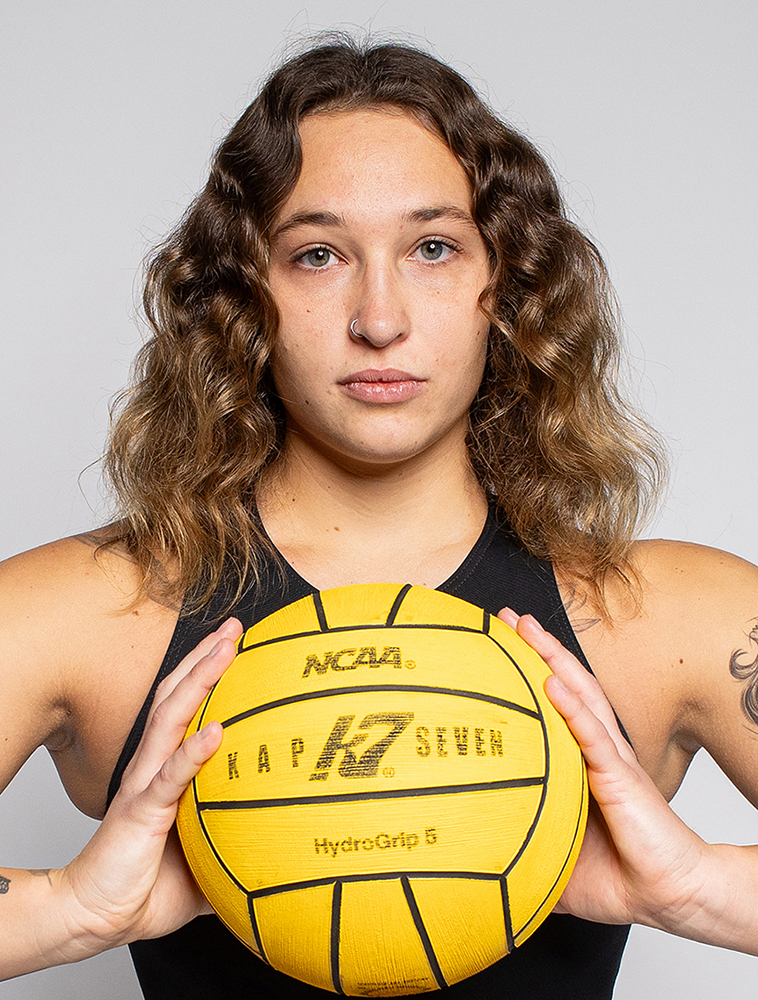CSUN was the ‘Home’ Students Needed on their Path to Graduation
Media Contact: Carmen Ramos Chandler, carmen.chandler@csun.edu, (818) 677-2130
Home comes in many forms and in many locations. For the graduation class of 2025, California State University, Northridge became a safe haven that allowed them to grow, explore who they were and realize that their dreams were possible.
More than 10,700 students are eligible to take part in CSUN’s commencement exercises this week. Each student has a personal story of hard work, perseverance and success. Below are just a handful of those stories:
Sanwal Dilshad, Doctorate in Physical Therapy

Sanwal Dilshad, 24, of Northridge, has spent the past seven years studying the human body and how it works, and he still finds it a marvel.
“Just picking up your finger, the muscles involved and the neurological input that’s being sent,” he said. “Think about how quickly your brain processes it. It’s happening in milliseconds. We think it’s a simultaneous reaction of just picking up your finger, but it’s actually coming down from your brain knowing that you made that decision to do it, traveling down those neurons and into your muscles and that then move your finger. It’s just remarkable how incredible the body is and how much we take it for granted.”
Dilshad grew up in Joshua Tree, the son of Pakistani immigrants.
“Joshua Tree is small town, and there were not a lot of opportunities. College seemed like the only way out,” he said. “I was a sophomore when I started thinking about what I wanted to do with my life. I knew I wanted to be in a field in which I could manifest some of the qualities that my parents instilled in me — caring, compassion and kindness. I also wanted to be in a profession that I enjoyed being in and going to work every day.”
Tapping into his love of sports, Dilshad discovered physical therapy.
“I liked the idea of knowing that you’re helping someone get better,” he said.
Dilshad’s path to his doctorate has not always been easy. Though a stellar student, some still doubted his ability to succeed. Then there were the occasional hate incidents.
“I was born in 2000, so much of my upbringing was defined by the post-9/11 rhetoric, especially in that small town where we didn’t have a lot of people who looked like us,” he said. “My family and I were subject to different periods of racisms or xenophobia. I vividly remember a remember a moment that I had when I had just graduated from high school, and I was physically harassed by someone. It was not uncommon, but it should have been.
“I realized that much of who I am today is defined by those comments, those perceptions of me,” Dilshad said. “But coming to LA, to CSUN, you’re exposed to more cultures, people are more accepting. You still have those moments, people will say stuff, but it’s not defining who I am anymore. There’s not much I can do to change people’s perceptions but to be the best person I can.”
At CSUN, Dilshad said that he found a community that not only supported his dream to become a physical therapist but encouraged him to use his experiences to educate others.
“I attribute much of my success and who I am today to being a CSUN student,” he said. “The opportunities that were given to me, the scholarships, the grants, the networking opportunities. We have faculty, especially in the physical therapy department, that are venerated across the state. I really took advantage of a lot of resources CSUN has to offer, and I am forever grateful for what they did.”
Dilshad is scheduled to take part in the College of Health and Human Development’s commencement ceremony at 8 a.m. on Monday, May 19.
Mohammadreza Iranpour, M. S. in Electrical Engineering

Mohammadreza Iranpour, 36, of Northridge, was working as a power engineer in his native Iran but was frustrated by the few opportunities he had to learn more about his field and to intellectually explore new ideas.
“I was working on optimization power and some matters related to power engineering,” he said. “However, there was this big gap between what I was doing and what I wanted to do. I knew I needed to update my knowledge of the subject, and I knew the only way I could do that was outside my country.”
He chose CSUN, he said, because he felt the university would give him that chance to learn and grown in his field. Despite barely speaking English, Iranpour and his wife Maryam left their native Iran for Southern California last year.
The transition was hard at first. Visa restrictions prohibited Miriam from working and limited Iranpour’s job opportunities to the campus.
“The first days, we didn’t have any friends or relatives, no sim card, bank account or car,” he said. “But when you come to a new country, a new city, a new location, and you don’t have a map or the internet, you focus on language. We improved our language skills step by step, day by day.”
Iranpour threw himself into his studies and was tapped by electrical engineering professor Rasoul Narimani to assist with his research, which focuses on understanding what happens when critical infrastructure systems, like power systems, are attacked and how to identify ways to detect such attacks and mitigate their impact.
“While some researchers are working on detecting such attacks, we are designing these types of attacks so that we can better understand them,” Iranpour said. “We know that there are going to be cyber-attacks on critical infrastructure, so we need to develop a defensive strategy to stop them before they can do any damage. It’s kind of like designing a vaccine for a virus you know will develop in the future.”
Before long, Iranpour’s name was appearing alongside Narimani’s on several professional conference papers, including one that took second place at the Texas Power and Energy Conference, one of the leading international peer-reviewed gatherings on power engineering.
The paper caught the eyes of researchers at UCLA’s B. John Garrick Institute for the Risk Sciences, who have offered Iranpour research assistant position to continue his work.
“When I first came to CSUN, I was just looking for ways to improve my career,” Iranpour said. “I did not think that in one year I would have published several papers, gotten awards for those papers and then receive a great offer from one of the top universities in the world. That would not have been possible without the support of my wife and family, and Dr. Narimani and CSUN. I do not know how to say thank you enough.”
Iranpour is scheduled to take part in the College of Engineering and Computer Science’s commencement ceremony at 6 p.m. on Friday, May 16.
Emili Linares, B.A. in Liberal Studies

For Emili Linares, 22, of Van Nuys, going to CSUN is the key to breaking “the generation curse of poverty.”
“I grew up in Reseda, sort of down the street for CSUN, and I have a lot of siblings, five older ones,” she said. “That’s where my main motivation and inspiration comes from. None of them went to college and we struggled a lot financially growing up. I saw my five older siblings work jobs that just weren’t enough to provide for us. I felt like college was the only way out, and CSUN was right there.”
Determined to ease the cost and make the transition to college as smooth as possible, Linares started her higher education career at Los Angeles Valley College to get her general education requirements out of the way before transferring to CSUN a couple years ago.
“I knew I wanted to be a teacher, so there was no question that I was going to major in liberal studies,” she said. “I’ve always loved children. I’m not a grown adult person. Grown people can be difficult in many ways. I feel like children are just very pure and they don’t have mean intentions. I want to guide children the right direction of being kind and respectful.
“I grew up in a very not safe and nice environment,” continued Linares, who spent some time in foster care as a child. “I just feel like if you teach them young to be kind and respectful, this world can become a better place.”
Though she lived not far from CSUN, Linares admitted she didn’t give the campus much thought until she got to high school and was considering her college options.
“Where I grew up down the street, it wasn’t the best-looking community,” she said. “I was just shocked at how beautiful CSUN was.”
As the first in her family to go to college, Linares had to figure out on her own the application process, how to apply for financial aid and how to navigate the institution’s bureaucracy. At least, she thought she did.
“But once I got here and settled down, I realized that there were people all over the campus who were willing and able to help me, if I just looked and asked,” she said.
She also found a community, a family in a way, as a member of CSUN EOP Milt and Debbie Valera Resilient Scholars Program, which supports current and former foster youth.
“Since I didn’t have my family around me much, the members of the program became my community,” she said. “They helped me forget about schoolwork sometimes and just be myself and have fun.
“You know,” she added,” only 3 percent of foster youth get a bachelor’s degree. I am going to be part of that three percent and, I hope, that I can, as a teacher, help other kids in foster care, or young people in general, that you don’t have to settle. That you can dream and make those dreams real.”
Linares is scheduled to take part in the College of Humanities’ commencement ceremony at 6 p.m. on Sunday, May 18.
Yemi Seyi, B.A. in Africana Studies
The path for a college education was laid decades ago by Yemi Seyi’s parents, who immigrated from Nigeria with dreams of a better life. Though circumstances forced the family to move a lot, education was always a priority.
“We didn’t always have the economic resources that needed to live the life that reflected their values and desires for us, but we did have safety at home and a belief in the power of education,” he said.
Seyi, 40, of Pasadena, admitted that all that moving growing up left him feeling unmoored.
“I never really got a chance to establish that sense of ‘home,’ but then I got to CSUN,” he said. “Stranglely, despite college being a place where a lot of people commute, and CSUN is a commuter school, I weirdly planted my roots here and found a sense of ‘home.’”
He enjoyed his classes and connected with the university’s Black student community.
“That was a very formative experience for me in terms of the journey that I’d been on and am finishing up,” Seyi said.
Seyi started at CSUN in 2002 as a political science major, with a minor in what was then Pan African studies. He fully intended to go on to law school. Just shy of graduation, he dropped out due to a combination of financial issues and the realization that law school “wasn’t exactly right for me,” he said.
He spent the next couple of decades at variety of jobs until he discovered the art of photography and documentary filmmaking.
“Navigating contested space and the establishment of ‘home’ is a central theme in much of my art and documentary work,” he said. “My practice involves the study of political-cultural mythologies, experimentation and travel.”
His skill as a filmmaker earned him a job as a documentarian with the Center for Restorative Justice, a Pasadena-based nonprofit that educates and equips communities to address the history of racial injustice and disrupt its ongoing impacts. It also prompted him to return to CSUN.
“I wanted to finish the journey I had started all those years ago, and reconnect with ideas, research and concepts that I could bring into my work,” Seyi said. “One of the things that really resonated with me the first time I was at CSUN was how history is narrated. I had been in school all my life, but college is different. You get to design your educational experience. You’re in control of your coursework, your journey.
“I was always interested in history, in people and how we got here and how we interact with one another,” he said. “CSUN allowed me to really cook in terms of how I would put that historical understanding together. When I was first at CSUN, I took Pan African studies classes and rooted that understanding in the Black perspective of history. I decided to finish that journey when I came back.”
Though he has earned a bachelor’s degree in Africana studies, Seyi isn’t done with CSUN. He hopes to return one day to complete his bachelor’s degree in political science.
“I’ll be back, it’s just a matter of when,” he said.
Seyi is a graduate of the College of Social and Behavioral Sciences.
Dorottya Telek, B.S. in Business Administration in Financial Analysis and in Marketing, with a Minor in Economics

Dorottya Telek has been swimming since she was three months old and playing water polo in her native Hungary since she was nine. An opportunity to play competitive water polo in California for a couple of months during her senior year in high school was one she could not pass up.
She and a couple of her friends thought the chance to play on a club team in the U.S. “seemed like fun,” she said.
“Everyone in Europe wants to experience what it’s like to be in the U.S.,” Telek said. “The original plan was for us to just come out and play water polo, take part in different tournaments for two months, discover the culture and travel around California. But I ended up being offered a scholarship to play at CSUN. It was like a dream.”
Telek was supposed to start classes in 2020, but the COVID-19 pandemic hit. She ended up taking her first three semesters from home in Hungary online, while practicing with her former club team to keep her skills up. She would get up at 5:30 a.m. to make the more than one hour commute to Budapest, where she would train for hours, and then make the commute back to get home in time for the start of her classes at 10 p.m., Hungary time.
“I would stay up until about 1 a.m., and then start the whole thing all over again,” Telek said. “I don’t know how I had the energy to do that — morning practices, afternoon practices, school, homework assignments. I just did it. Honestly, it was worth it because when I finally got here, these last three years, actually, the whole four years have been such a blessing. I had such a fun time; I would do it all again even though it was very tiring.”
A three-time All American in women’s water polo, Telek led the Big West conference this season with 91 goals and 129 points to go with shooting at a 58.7 percent clip from the field. In four seasons as center, Telek scored a school record 363 career goals, far surpassing the previous mark of 229. Telek is also a three-time All-Big Wast honoree, including a two-time All-Big West First Team selection. She also holds the CSUN record for the most Big West Player of the Week awards in school history, earning her fifth this year.
She was also the first Matador in history to be named to the Cutino Award Watch list, named in honor of the late Hall of Fame coach Peter K. Cutino, which recognizes the best player in men’s and women’s college water polo.
Outside of the pool, Telek said she enjoyed her classes. She couldn’t decide which subject to major in — finance or marketing — so she chose to double major, with a minor in economics “because it’s interesting.”
“It was very interesting to study these subjects because they are very important to businesses and I have a much better understanding about what each area does and for what reason, and how they work together,” she said.
It’s knowledge she’ll be taking back to Hungary with after graduation.
“I really loved being here, but I also miss home,” she admitted.
Telek is scheduled to take part in the David Nazarian College of Business and Economics’ commencement ceremony at 8 a.m. on Saturday, May 17.
The post CSUN was the ‘Home’ Students Needed on their Path to Graduation first appeared on CSUN Newsroom.






